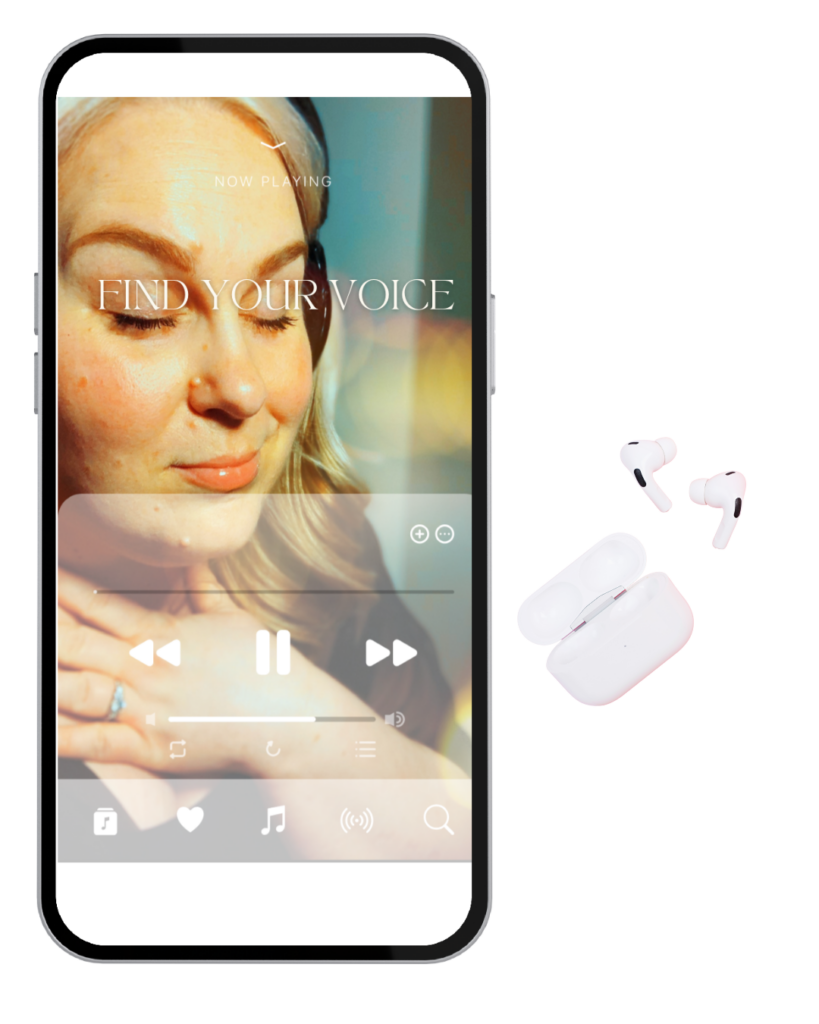© - Content and images in this blog are copyright Elise Besler of EB Voice Empowerment, unless stated otherwise. Feel free to repost or share images for non-commercial purpose, but please make sure to link back to this website and its original post.
℗ - We do not store any information about your visit to our website other than for analytics and optimization for content and reading experience through the use of cookies.
℅ - Our site does at times contain paid advertisements, sponsored content, and/or affiliate links.
Reader Etiquette
I'm your go-to expert for helping to ditch the fear and own your voice. Whether you’re speaking, singing, or setting boundaries, I help you go beyond technique -rewiring your nervous system so full expression feels natural, effortless, and so you.
Hi! I'm Elise Besler - Voice Coach & Somatic practitioner
March 4, 2025

Have you ever felt like there’s a lump in your throat when you try to speak up? Or maybe your voice feels tight, weak, or completely stuck in high-stress situations? You’re not imagining it. A blocked throat isn’t just a metaphor ~ it’s a real physiological response tied to your nervous system and past experiences.
If you’ve ever struggled to fully express yourself, your body may be holding onto protective patterns that keep your voice trapped. In this post, we’ll explore the nervous system’s role in vocal restriction, why your throat might feel blocked, and how to gently retrain your body to release tension and reclaim your voice.
Why Your Throat Feels Blocked: The Nervous System Connection
Your throat is more than just a passage for air and sound—it’s deeply connected to your autonomic nervous system. When your body perceives stress or threat, it shifts into survival mode, which directly impacts your ability to speak.
1. The Freeze Response and Vocal Shutdown
When faced with perceived danger (whether physical or emotional), your body has three main survival responses: fight, flight, or freeze. If neither fighting nor escaping is possible, your body may freeze—shutting down movement, including your voice. This can show up as:
- A tight, constricted throat
- Inability to speak when overwhelmed
- A feeling of being “choked up” when emotional
This response is common in people who have experienced past trauma, repeated silencing, or high-stress environments where speaking up felt unsafe.
2. Stored Emotional Tension in the Throat
Unprocessed emotions don’t just disappear ~ they get stored in the body, particularly in areas associated with expression. If you’ve had to suppress grief, anger, or fear, your throat muscles may unconsciously tighten to keep those emotions in.
3. Hypervigilance and Holding Patterns
If you’ve been conditioned to be extra cautious about how you speak, your throat may remain in a chronic state of tension. This can come from:
- Fear of judgment or rejection
- Overthinking your words before speaking
- A history of being dismissed, interrupted, or silenced
How to Break the Pattern and Free Your Voice
If your throat feels blocked, it’s a sign your nervous system needs safety, permission, and practice to open up again. Here’s how to start the process:
1. Activate the Vagus Nerve for Vocal Release
The vagus nerve is key in regulating the nervous system and plays a major role in vocal expression. To signal to your body that it’s safe to use your voice, try:
- Humming: Creates soothing vibrations that relax the throat
- Gargling water: Stimulates the vagus nerve and improves vocal tone
- Long exhalations: Breathe in for four counts, exhale with a sigh for six counts
2. Shake Off the Freeze Response
If your throat tightness is linked to a freeze state, movement is key. Try:
- Gently shaking your hands, neck, and shoulders to release held tension
- Bouncing on your heels to wake up your system
- Yawning widely to open the throat naturally
3. The Power of Vocal Work: Singing, Humming, and Chanting
Voice work is one of the most effective ways to release throat tension and build vocal confidence. These practices gently activate the vocal cords, open the throat, and regulate the nervous system:
- Humming for Nervous System Regulation – The vibration of humming naturally soothes tension and calms the body.
- Chanting for Energy Release – Repeating a simple sound, like “Om” or “Ahhh,” helps to move stuck energy through the throat and chest.
- Singing for Emotional Liberation – Singing allows for full vocal range expansion, helping to unlock self-expression and move emotions through sound.
- Toning for Grounding – Sustaining a single note (toning) creates a deep resonance in the body, helping to release emotional blockages.
By incorporating these voice practices regularly, you can begin to rewire your nervous system for vocal safety and confidence.
Final Thoughts: Releasing the Block, Reclaiming Your Voice
If your throat feels blocked, it’s not just in your head—it’s in your body. But the good news is, you don’t have to stay stuck. By working with your nervous system instead of forcing it, you can gently unravel the patterns that have kept your voice locked away.
Your voice is meant to be free. It’s time to reclaim it.
— If you’ve ever struggled to speak up, felt your voice shake in high-stakes moments, or questioned if your words truly mattered, this practice is for you! —
Click HERE for immediate access to the FREE “Find Your Voice” Guided Audio Training.
Take 11 minutes to activate the power of your voice with this guided practice. Includes: Grounding, breath-work and voice-work exercises to help you regulate your nervous system and build a confident voice.

Leave a Reply Cancel reply
Grab
THE "Find YOUR VOICE" AUDIO TRAINING
Welcome, Friend! Around here, we believe that embodiment is sacred, and that every voice deserves to take up space.
This is a space rooted in anti-racism, body liberation, queer-affirming practices, and a commitment to trauma-aware, nervous system-informed growth.